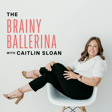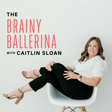
62. The Truth About Being a Ballerina with Gavin Larsen
In this episode, I’m joined by former principal ballerina and author Gavin Larsen to discuss the full arc of a ballet career - from the innocence of a child’s first class to the quiet, often emotional decision to step away from the stage.
With striking honesty and warmth, Gavin retraces her early, formative years as a student in New York, through the rigorous training at the School of American Ballet, into her professional years with major companies like Pacific Northwest Ballet, Alberta Ballet, and Oregon Ballet Theatre. Along the way, she touches on issues that resonate deeply with dancers at all levels: identity, injury, finding artistic fulfillment, and reinvention.
This episode not only provides a front-row seat to Gavin’s career but also gives listeners a behind-the-scenes look at the creation of her acclaimed memoir Being a Ballerina, the Brainy Ballerina Book Club’s current pick!
Key “Pointes” in this Episode
- Gavin’s training at the School of American Ballet beginning at the age of 11
- The start of her professional career in the corps of Pacific Northwest Ballet
- How Gavin chose to move to Alberta Ballet - a smaller company that offered huge artistic opportunities and growth
- The chance meeting that led Gavin to Oregon Ballet Theatre, the company she would finish her dance career with
- How she knew it was time to retire from the stage after 18 years as a professional ballerina
- The journey of writing her memoir, Being a Ballerina, starting with vivid, honest “snapshots” of her dance life.
Connect with Gavin:
WEBSITE: www.gavinlarsen.com
FACEBOOK: facebook.com/GavinLarsenAuthor/
INSTAGRAM: instagram.com/gavinalarsen/
Links and Resources:
Join the Brainy Ballerina Book Club: https://www.thebrainyballerina.com/the-brainy-ballerina-book-club
Get 20% off your first order of ALOHA protein bars: https://aloha.com/BRAINYBALLERINA
1-1 Career Mentoring: book your complimentary career call
Let’s connect!
My WEBSITE: thebrainyballerina.com
INSTAGRAM: instagram.com/thebrainyballerina
Questions/comments? Email me at caitlin@thebrainyballerina.com

